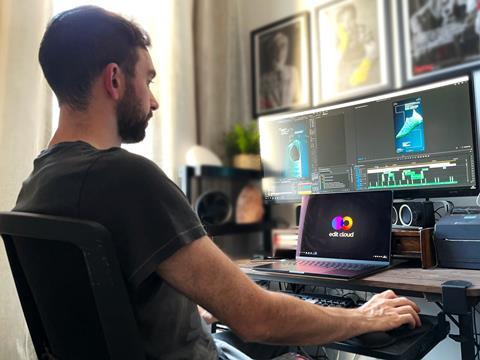The software enables producers to create cloud-based edit suites and crew them with experienced editors for the duration of their project

Newly launched software platform Edit Cloud provides producers with the option of spinning up on-demand cutting rooms in the cloud, operated by accredited editing talent.
The cloud-based virtual editing rooms enable a pay-as-you-go way of provisioning editing resource. Broadcast Tech caught up with Edit Cloud founder and CEO, Simon Green, to find out more.
“Edit Cloud is a completely cloud-based editing ecosystem,” sums up Green. “We virtualise the entire edit suite experience – it isn’t remoting into a facility in Soho it’s completely based in the cloud. So, the media assets and the edit machine are in the cloud – all you need is a screen, a keyboard and a basic domestic internet connection. You could be working on a 10-year-old MacBook in a café, or from an edit suite in Soho with three screens, if you prefer, and still be accessing Edit Cloud. We take the edit suite to the talent, wherever they are.”
Edit Cloud is platform agnostic, working with Avid, Adobe, and DaVinci Resolve and with cloud content storage providers Azure, AWS and Lucid Link, and integrate Iconik, Cat DV and Mimir as cloud-based MAMs.
It was created by Edit Cloud in partnership with its tech partner base, which provided the infrastructure to enable Edit Cloud to scale in the cloud. ”[Base founder] Ben Foakes has supported our vision from day one – having a likeminded parter with their particual skillset has been a critical part to our success,” explains Green.
Talent
As well as the editing kit, Edit Cloud has built access to the talent itself, through an accredited scheme that matches experienced editors to specific projects being cut on the platform.
Green explains: “A production manager will be able to go on Edit Cloud and find an editor, check their availability, book that editor, and then connect that editor straight to an edit suite, whether it’s an Avid or an Adobe edit suite, and off they go.
“We are bringing talent into our ecosystem because we recognise it’s not good enough to just have virtual technology. It’s about connecting that technology to talent, in the most efficient way.”
Work from Anywhere
The ability to access the editing system from anywhere and at any time has clear flexibility benefits, argues Green. “If you’re an editor who works best coming into Soho, then great. But we know of top editors that are like, ‘Listen, on Thursdays and Fridays, I have to be home for my kids’. If you can make it easy for that editor to have that work-life balance then they will be more productive, and will want to work with you even more.”
He adds: “I think the industry sometimes broad-brush cloud or remote technology with the label of working from home. It’s not that – Edit Cloud is about work from anywhere, which reflect modern day productions. So we don’t care if you want to work from a beach, if you want to work from home, or you need to come to the studio; we just want people to be in the environment where you get the best out of them.”
The company also claims its edit suites create half the amount of carbon compared to an on-prem suite.
Academy
To create a verified marketplace for editing talent, Edit Cloud is creating an Academy and utilising a blockchain to store details of each editor’s skills and experience.
“We want our accreditation modules to be tokenised so that if I’ve done a course for Adobe or for Avid or a course for, say, working on Love Island, it becomes part of my digital identity. If you are applying for a job, the client can build learning modules around that particular show, to ensure the editor has the relevant skills and experience for that production.”
Accountability
Edit Cloud provides usage analytics for clients, detailing exactly when and for how each edit suite was used and by which editor. “For big enterprise businesses that are trying to find efficiencies, it starts by being accountable and having visibility on what’s being used,” says Green. “The post-production industry has survived off the ability of doing a little bit of smoke and mirrors, but clients are increasingly digging into exactly where their money is going. There’s going to be more at senior level now wanting to audit and understand where every penny is going. Equally, there is a duty of care to editors that are working 16 hour days that go unnoticed because of hybrid working, and when you have data to show these patterns, production teams can make sure they are resourced and supported properly.”
Customers
One of Edit Cloud’s first customers was Oscar winner Walter Murch, who described the platform as a “game changer”. Other customers on the platform include Sky, and ITV studios, which is primarily using Edit Cloud to streamline flexible working for its editors. When editors go into ITV studios, they can login the same way they would if they were working from home.
Once logged in, the software, plugins, the fonts and so on are all provided and set up in the same way each time. “So, there’s no, ‘Oh, it’s a different version of the software, or I don’t have any of my plugins, or I downloaded that image locally or whatever,” says Green.
Edit Cloud is also working with international brands and film studios. “The ‘follow-the-sun model’ is something we are really passionate about, which aligns with the enterprise brands and studio partners that we are working with, and reflects our vision of connecting opportunities to talented creators using the best technology available,” explains Green.





























No comments yet